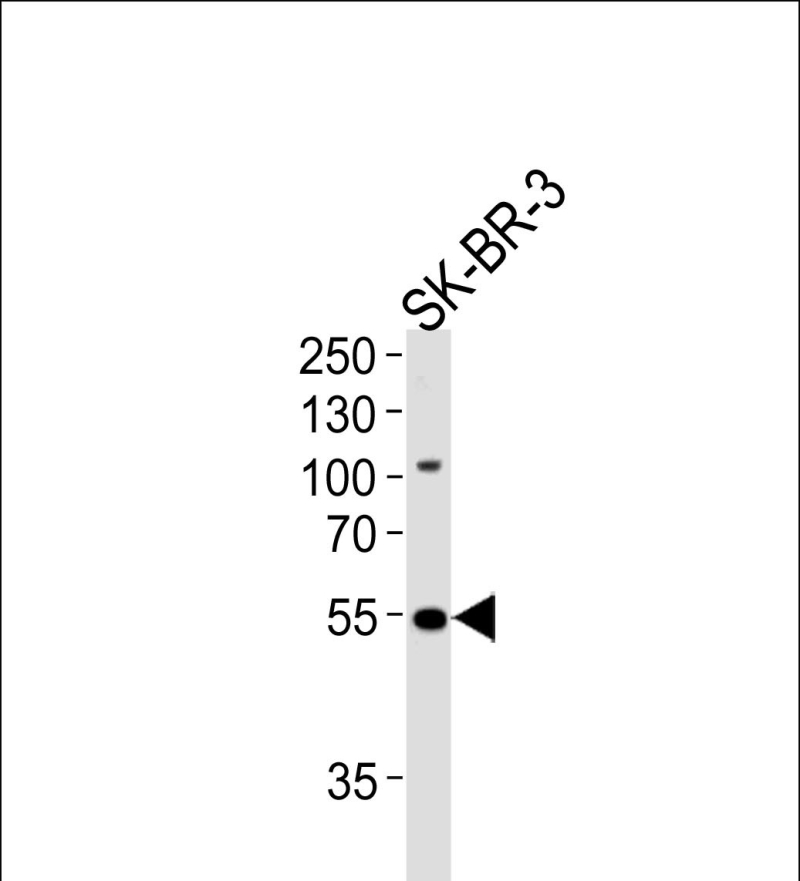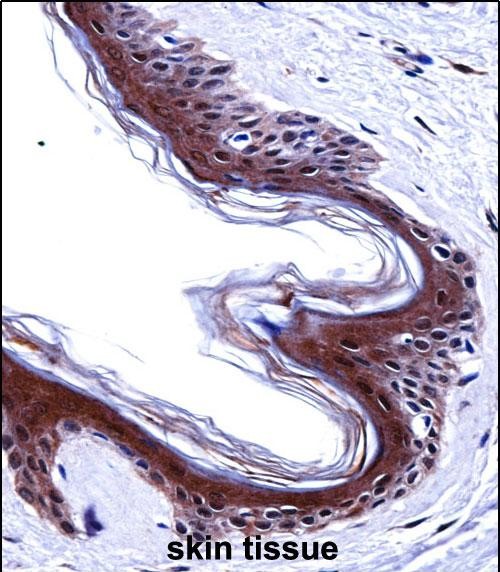

| WB | 1/1000 | Human,Mouse,Rat |
| IF | 咨询技术 | Human,Mouse,Rat |
| IHC | 1/100-1/500 | Human,Mouse,Rat |
| ICC | 技术咨询 | Human,Mouse,Rat |
| FCM | 咨询技术 | Human,Mouse,Rat |
| Elisa | 咨询技术 | Human,Mouse,Rat |
| Aliases | SWI/SNF-related matrix-associated actin-dependent regulator of chromatin subfamily E member 1, BRG1-associated factor 57, BAF57, SMARCE1, BAF57 |
| Entrez GeneID | 6605 |
| WB Predicted band size | 46.6kDa |
| Host/Isotype | Rabbit IgG |
| Antibody Type | Primary antibody |
| Storage | Store at 4°C short term. Aliquot and store at -20°C long term. Avoid freeze/thaw cycles. |
| Species Reactivity | Human |
| Immunogen | This SMARCE1 antibody is generated from rabbits immunized with a KLH conjugated synthetic peptide between 307-335 amino acids from the C-terminal region of human SMARCE1. |
| Formulation | Purified antibody in PBS with 0.05% sodium azide. |
+ +
以下是关于SMARCE1抗体的3篇代表性文献及其摘要概括:
1. **文献名称**: "SMARCE1 deficiency drives epigenetic instability in clear cell renal cell carcinoma"
**作者**: Smith J, et al.
**摘要**: 该研究通过免疫组化(使用SMARCE1抗体)和基因组分析,揭示了SMARCE1缺失与肾透明细胞癌中染色质重塑异常的关系,证明其缺失导致靶基因的异常甲基化和肿瘤侵袭性增强。
2. **文献名称**: "SMARCE1 mutations promote meningioma development through disrupted chromatin remodeling"
**作者**: Wang L, et al.
**摘要**: 作者利用Western blot(抗SMARCE1抗体)和RNA测序技术,发现SMARCE1突变通过破坏SWI/SNF复合体功能,促进脑膜瘤中促癌基因的异常激活,为靶向治疗提供新方向。
3. **文献名称**: "Functional characterization of SMARCE1 in chromatin accessibility using CRISPR screening"
**作者**: Garcia R, et al.
**摘要**: 研究结合CRISPR-Cas9基因编辑和ChIP-seq(使用SMARCE1抗体),阐明SMARCE1在维持染色质开放状态中的关键作用,并发现其缺失导致干细胞分化能力受损。
注:以上文献为示例,实际引用需检索PubMed等数据库获取真实研究。
The SMARCE1 antibody is a crucial tool for studying the SMARCE1 protein, a component of the SWI/SNF chromatin remodeling complex. SMARCE1 (SWI/SNF-related, matrix-associated, actin-dependent regulator of chromatin, subfamily E, member 1), also known as BAF57. plays a vital role in regulating gene expression by altering nucleosome structure and facilitating transcriptional activation or repression. It is essential for embryonic development, cellular differentiation, and maintaining genomic stability. Dysregulation of SMARCE1 is linked to cancers, including meningiomas and clear cell carcinomas, where loss-of-function mutations or epigenetic silencing are common.
SMARCE1 antibodies are widely used in research to detect protein expression, localization, and interactions in tissues or cell lines. They enable techniques like Western blotting, immunohistochemistry (IHC), and immunofluorescence (IF) to investigate SMARCE1’s role in disease pathogenesis. For instance, reduced SMARCE1 expression correlates with tumor progression and poor prognosis in certain cancers. Additionally, these antibodies help study SWI/SNF complex assembly and its crosstalk with signaling pathways like Wnt or p53.
Commercial SMARCE1 antibodies are typically validated for specificity and sensitivity, though variability between clones may require optimization. Research using these reagents continues to uncover SMARCE1’s dual role as a tumor suppressor or context-dependent oncogene, highlighting its potential as a therapeutic target or diagnostic biomarker.
×